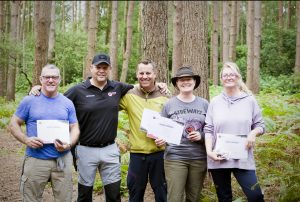Bosses pit their wits against nature for ‘pandemic mindset re-set’

North West bosses are ditching the office to pit their wits against nature in a bid for a ‘mindset re-set’.
Cheshire firm Spartan Survival has seen a six-fold increase in bookings since the pandemic eased. In the space of a year, attendances on the course have risen from 10-a-month to 60-a-month.
Spartan Survival runs bushcraft and survival courses at sites in Cholmondeley, Cheshire.
It also operates an elite course at a secret location in Scotland, which offers similar challenges to those featured on survival TV programmes.
Almost a third of those taking part are women and Spartan is now offering female-only courses. There has also been a spike in demand for elite training as executives try to address ‘pandemic brain fatigue’.
Business leaders attending courses are put through their paces by accomplished elite military veterans, serving as course instructors, who share their insight and skills with attendees, imparting various military techniques and survival knowledge in the process.
Ian Huntington, co-founder of Spartan Survival and its chief instructor, said those attending courses quickly find they can develop skills they can transfer back into their day-to-day working life.
He said: “Those running businesses often turn up to our courses with their minds crammed full of things they need to do and tasks they think they need to complete.
“But as soon as they arrive we make clear they need to press pause on all of that and instead encourage them to focus on just four things: Shelter, fire, water and food.
“Many are a bit wary of handing in their mobile phones, and some look nervous as they head off to spend two or three days on their own in the wilderness, device-free, with the only task on their to-do list being survival.
“But by the end of the course they’ve gone through a total re-set in their minds. Everyone who attends later reports how much it helps to improve their performance once back at work.”
He added: “Our courses are also proving really popular, too, for groups of co-workers who are no longer based in the same location. It’s clear the pandemic has transformed the working environment and many companies now feel detached by work from home, even though it does have its plus points.
“But by attending a course, people find they can work together again, side-by-side in a challenging environment and it creates a stronger bond and team spirit.”
Jan Chillery, a partner at the Chester based law firm Aaron and Partners, said the course had equipped her with key skills she could transfer back into her working life.
She said: “Putting away my phone was unexpectedly therapeutic and made me concentrate more on the moment. It’s a great team-building experience, something colleagues would talk about for years to come.

Ian Huntington, second from left, and Jan Chillery, second from right
“The skills you get from it aren’t just about bushcraft, although learning those things is surprisingly satisfying. It’s about problem solving, thinking through unusual challenges, improving communication and promoting positive attitudes.”
The surge in the number of businessmen and women signing up for survival courses comes as experts warn UK business have yet to hit the heights of employee fatigue caused by the pandemic.
According to researchers at Gartner, one of the major consequences of the pandemic and shift to remote working has been the impact on employee mental health and wellbeing.
The research revealed that UK employees have been 62% more likely to see an increase in their day and that 42% now feel emotionally drained from their work. Employees are still struggling to recover from the burnout suffered because of the events of the past two years.
Sir Cary Cooper, Professor of Organisational Psychology & Health at the Manchester Business School, said the success of Spartan Survival underlines the importance of workers taking time out from office life.
He said: “We know in the UK that the leading cause of long term sickness absence is stress, anxiety and depression.
“It’s not just in the UK, but in most developed countries that’s the leading cause of long term sickness absence. People are under more pressure than ever before, feeling more job insecurity, worried about the cost of living, and so on.”
He said to get some reflective time away from the workplace and the constant bombardment of technology, like emails and Zoom meetings, can help attendees put everyting into perspective and to re-energise.





